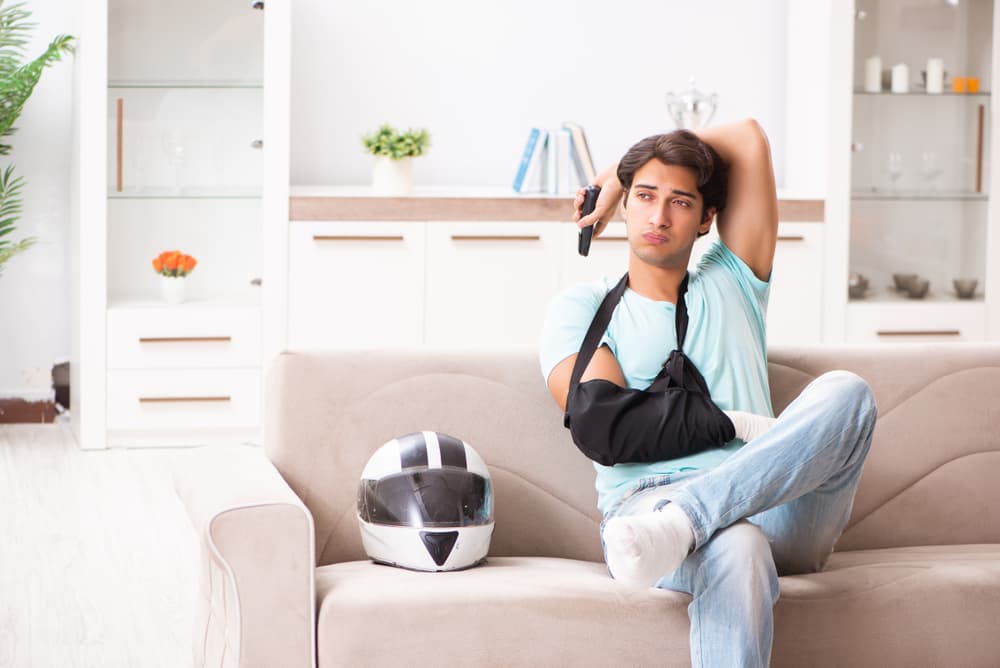Motorcycle accidents frequently happen when other drivers commit negligent acts while on the road. Since motorcycle riders have very little protection surrounding them, they are prone to suffering disabling injuries – especially during a high-speed collision. Those injuries may include bone fractures, traumatic head and brain injuries, and other serious medical complications.
If you or someone you love suffered a disabling injury in a recent motorcycle crash, you need to retain skilled legal representation for your case. A knowledgeable Edmonton motorcycle accident lawyer can begin an investigation into your accident, file a claim with the responsible party’s insurance company, and, if necessary, pursue litigation in the court system on your behalf.
Types of Motorcycle Accidents that Lead to Serious Injuries and Disabilities

Motorcycle accidents resulting from another driver’s negligence can result in a range of injuries, each leading to specific disabilities that profoundly affect the victims’ lives. One common scenario is a collision at traffic intersections, where a driver fails to yield the right-of-way to a motorcyclist. These accidents often result in severe injuries, such as fractures, which can lead to mobility limitations and long-term disabilities.
Another common type of motorcycle accident stems from rear-end collisions, where a driver strikes a motorcycle from behind. In these instances, the motorcyclist may be thrown from their bike, resulting in traumatic brain injuries (TBIs). TBIs can cause cognitive impairments, memory loss, and other neurological issues, significantly affecting a person’s daily functioning and quality of life.
Left-turn accidents, where a driver turns in front of an oncoming motorcycle, are also a common cause of disabling injuries. These accidents frequently lead to leg and knee injuries, including fractures and ligament damage, which can result in mobility challenges and permanent disabilities.
Side-impact collisions, often referred to as T-bone accidents, can also cause significant harm to motorcyclists. These accidents may result in injuries to the pelvis and hips, leading to disabilities that affect the individual’s ability to walk or engage in regular physical activities.
The disabilities resulting from these types of motorcycle accidents are diverse and can include paralysis, amputations, and permanent impairments affecting the use of limbs. Spinal cord injuries, particularly in accidents where the motorcyclist is ejected from their bike, can lead to paralysis and lifelong challenges in mobility and daily functioning.
Moreover, the emotional toll of these disabling injuries should not be overlooked. Victims may experience post-traumatic stress disorder (PTSD), anxiety, and depression, all of which contribute to an overall decrease in their quality of life.
In general, motorcycle crashes resulting from another driver’s negligence can lead to severe, disabling injuries that bring about a range of specific disabilities. These injuries not only affect the physical well-being of victims but can also have lasting implications on their mental health and overall quality of life.
What are the Legal Elements of a Motorcycle Accident Claim or Lawsuit?
For a disabled victim of a motorcycle accident, proving the legal elements in a claim or lawsuit is essential to seeking compensation for the damages they endured. The first crucial element is establishing negligence – or showing that the other party was at fault. This involves demonstrating that the other driver failed to exercise reasonable care, directly contributing to the accident and resulting in injuries.
Causation is the second key legal element, requiring the disabled motorcycle accident victim to establish a direct link between the negligent actions of the other driver and the injuries sustained. It involves showing that the injuries were a foreseeable consequence of the negligent behaviour, emphasizing the connection between the accident and the resulting disabilities.
Furthermore, the disabled victim must demonstrate the existence of actual damages. This encompasses the tangible losses they incurred due to their accident, such as lost income, loss of earning capacity, mental distress, or pain and suffering. The severity of disabilities resulting from the accident plays a crucial role in determining the extent of these damages, influencing the overall compensation sought.
Medical evidence also becomes essential in establishing the extent of disabilities and their connection to the motorcycle accident. Detailed medical records, expert opinions, and testimony from healthcare professionals are instrumental in proving the severity and permanence of the injuries, reinforcing the need for compensation.
Witness statements and accident reconstruction experts also play a role in corroborating the disabled victim’s version of events. Eyewitness accounts can provide valuable perspectives, while accident reconstruction experts can use scientific methods to recreate the sequence of events, helping to establish the facts surrounding the crash.
Overall, a disabled motorcycle accident victim must navigate through several legal elements to build a compelling case. Proving negligence, establishing causation, demonstrating actual damages, and presenting strong medical and expert evidence collectively form the foundation of a successful claim or lawsuit. By carefully and thoroughly addressing these legal elements, disabled victims can seek the compensation they need to cope with the challenges that their disabilities may pose.
Types of Damages You Can Recover for Motorcycle Accident Disabilities
When a motorcycle accident leaves an individual disabled, seeking compensation involves understanding the damages that are available.
Economic damages constitute the tangible financial losses resulting from the accident, encompassing both lost income and loss of earning capacity. A disabled individual may face challenges in returning to work, or their ability to earn a living may become significantly compromised. Compensation for lost income seeks to lessen the economic consequences of the disability, ensuring that the individual receives financial support for their altered employment situation.
Non-economic damages address the intangible losses and suffering that disabled individuals experience after their motorcycle accident. Pain and suffering – encompassing both physical and emotional distress – are a significant part of non-economic damages. Chronic pain, mental anguish, and the overall reduction in quality of life due to the disability are important considerations within this category.
Loss of consortium, which pertains to the effect of the disability on personal relationships, is another important element of non-economic damages. This recognizes the strain that a disability can place on family and spousal relationships, acknowledging the emotional toll on both the disabled individual and their loved ones.
The various damages available to a disabled motorcycle accident victim extend well beyond economic damages, like lost earnings. Non-economic damages address the intangible consequences of the collision, including pain and suffering, loss of consortium, and the overall effect on the victim’s quality of life. Pursuing a comprehensive range of damages helps disabled motorcycle accident victims become whole again – to the greatest extent possible – following their collision.
Negotiating with the Insurance Company after Suffering a Disabling Injury in a Motorcycle Crash
After a motorcycle accident resulting in a disabling injury, a skilled motorcycle accident lawyer plays an important role in negotiating with the at-fault driver’s insurance company to secure fair compensation for the victim. This negotiation process is complicated and requires a well-planned, strategic approach.
First, the lawyer gathers extensive evidence to build a compelling personal injury case. This evidence may include medical records, expert opinions on the extent of disabilities, accident reports, and any relevant documentation supporting the victim’s claim. This evidence forms the foundation for the negotiations, providing a clear picture of the effect of the accident on the disabled individual’s life.
The lawyer then calculates the full extent of the disabled motorcyclist’s damages. This involves quantifying economic damages, such as lost income and loss of earning capacity, as well as non-economic damages, like pain and suffering, emotional distress, mental anguish, and decreased quality of life due to the disability. A careful assessment of these potential damages is essential for presenting a well-founded compensation demand.
When initiating settlement negotiations, the lawyer will draft a demand letter which thoroughly outlines the specifics of the victim’s case – and the amount of compensation that they are seeking. This letter also serves as the starting point for discussions with the at-fault driver’s insurance company. It outlines the legal basis for the claim, the nature of the victim’s disabling injuries, and the financial effect on the disabled individual.
Negotiation often involves a series of back-and-forth negotiations between the accident victim’s lawyer and the insurance company adjuster handling the claim. The lawyer leverages the strength of the evidence and legal arguments to persuade the insurance company to offer a fair settlement. Skilled negotiation techniques, clear communication, and a deep understanding of the legal and medical aspects of the case are essential during this stage.
If the insurance company responds with a counteroffer, the accident victim’s lawyer carefully evaluates it to determine its fairness and adequacy in addressing the victim’s damages. The negotiation process continues until a mutually acceptable settlement is reached. However, if negotiations prove unsuccessful, the victim’s lawyer may explore alternative avenues – such as filing a lawsuit in the court system – to pursue the victim’s rights through the legal system.
Throughout every stage of the proceedings, an experienced motorcycle accident lawyer can be your advocate, using their legal experience and strong negotiation skills to engage with the at-fault driver’s insurance company effectively. Through strategic communication and a full understanding of the damages you’ve suffered, your personal injury lawyer will work hard to maximize the settlement or litigation compensation you ultimately recover in your case.
Taking a Motorcycle Accident Case to Trial or ADR
When a motorcycle accident case resulting in disability reaches an impasse during negotiations, the injured party, with the guidance of their lawyer, may consider taking the matter to a trial or alternative dispute resolution (ADR) proceeding, such as mediation or binding arbitration. Each path presents distinct advantages and considerations.

Opting for a trial involves presenting the case before a judge and, in some instances, a jury. This formal legal process allows both parties to present evidence, call witnesses, and make legal arguments in a court of law. The judge or jury then deliberates and issues a verdict, determining liability and, if applicable, the amount of compensation to be awarded. Trials provide a structured and formalized approach to resolving accident-related disputes, but they can be time-consuming and may involve higher legal costs.
On the other hand, alternative dispute resolution methods offer a more collaborative and flexible approach. Mediation, for example, involves a neutral third-party mediator who assists both parties in reaching a mutually agreeable resolution. The mediator does not make binding decisions but facilitates communication and negotiation between the parties. Mediation can be particularly beneficial for preserving relationships, as it fosters a more cooperative atmosphere.
Binding arbitration is another ADR option where an arbitrator, chosen by both parties or appointed by a court, reviews the evidence and renders a final, legally binding decision. This process is typically less formal than a trial and provides a quicker resolution.
The decision to pursue a trial or ADR depends upon various factors, including the complexity of the case, the willingness of both parties to engage in collaborative resolution, and the desire for a speedier resolution. While trials offer a definitive and formal resolution, ADR methods provide more control to the parties involved in shaping the case outcome.
In cases involving disabilities resulting from a motorcycle accident, the choice between trial and ADR also considers the unique challenges and needs of the disabled accident victim. ADR methods may offer a less adversarial environment, allowing for a more careful consideration of the various effects on the accident victim’s life.
Ultimately, whether opting for a trial or ADR, the goal remains the same: to seek fair compensation for the disabled individual’s damages. The decision hinges on careful consideration of the case’s specifics, the preferences of the parties involved, and the potential benefits of each approach in securing a just and favorable resolution.
Contact a Motorcycle Accident Lawyer Near You Today

If you recently sustained injuries in a motorcycle crash that resulted from someone else’s negligence, a Edmonton personal injury lawyer in your area can help. Your lawyer can explore your potential legal options, take the necessary legal steps on your behalf, and fight for your right to recover the full monetary damages you deserve for your disability.
With a disabling injury, you have enough on your plate. Allow an experienced motorcycle accident lawyer to handle the entire legal process for you.
